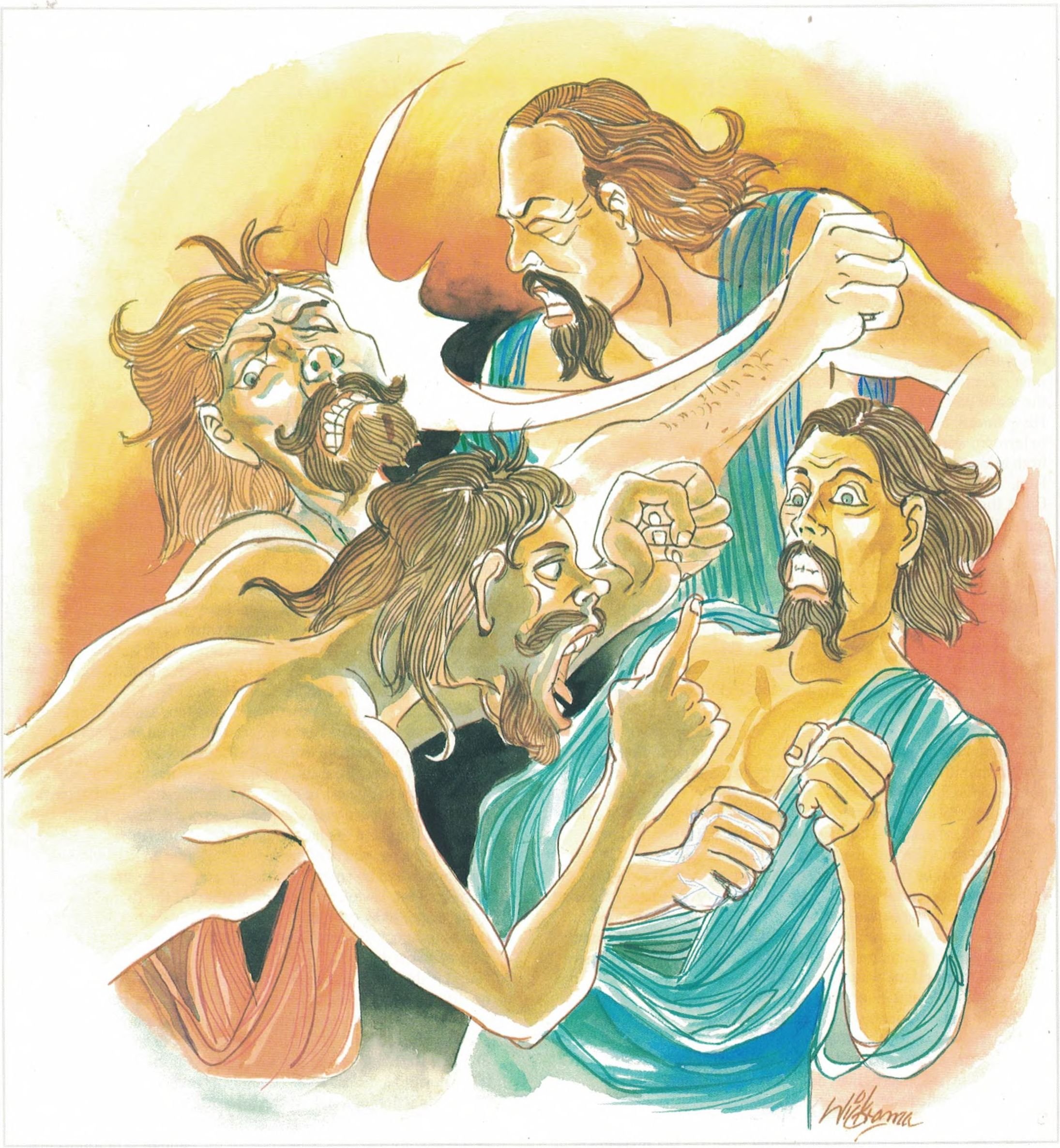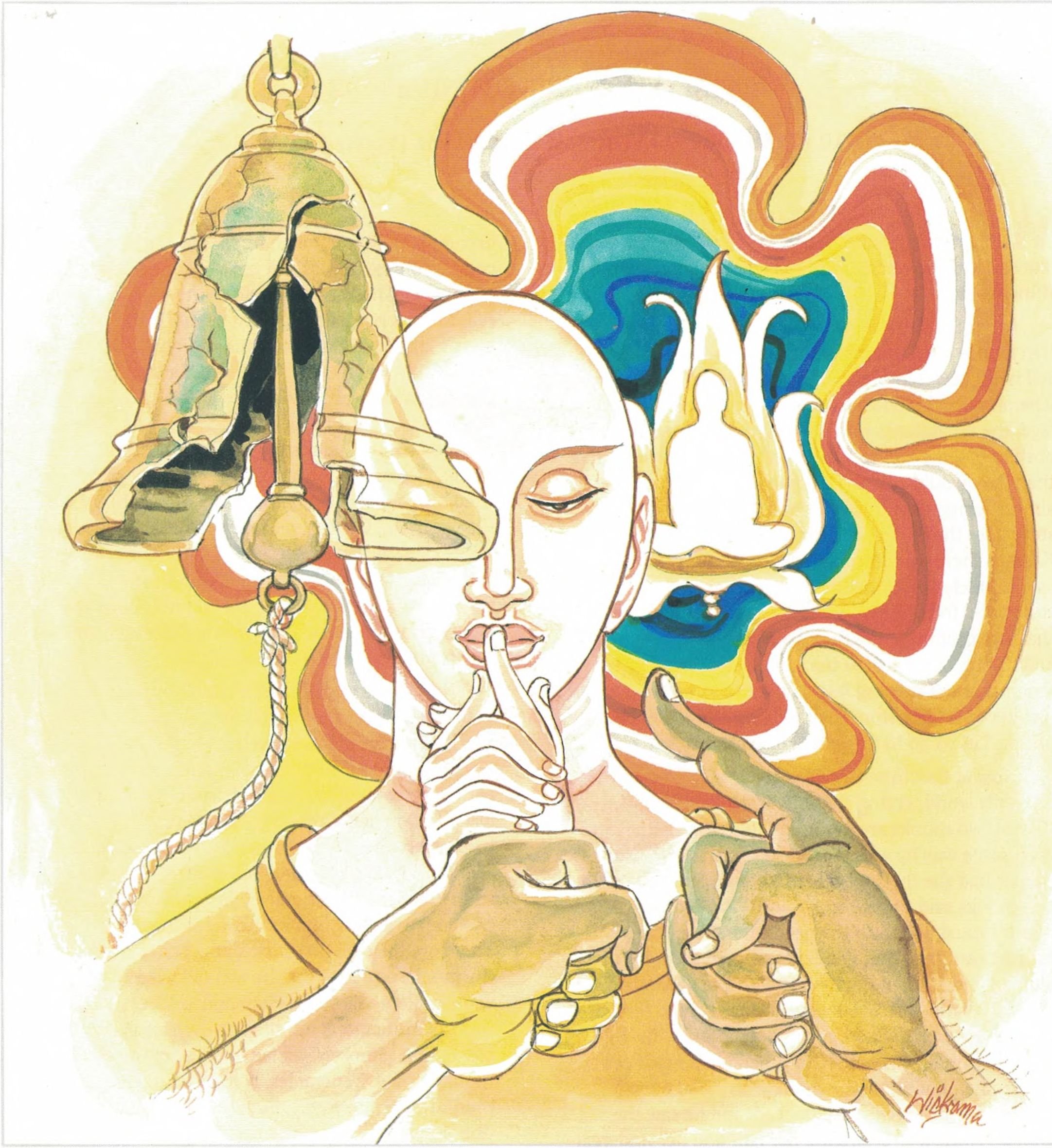Dhammapada (Illustrated)
by Ven. Weagoda Sarada Maha Thero | 1993 | 341,201 words | ISBN-10: 9810049382 | ISBN-13: 9789810049386
This page describes The Story of Venerable Kundadhana which is verse 133-134 of the English translation of the Dhammapada which forms a part of the Sutta Pitaka of the Buddhist canon of literature. Presenting the fundamental basics of the Buddhist way of life, the Dhammapada is a collection of 423 stanzas. This verse 133-134 is part of the Daṇḍa Vagga (Punishment) and the moral of the story is “Use no harsh words. It is painful. More harsh words will follow with retaliatory action” (first part only).
Verse 133-134 - The Story of Venerable Kuṇḍadhāna
Pali text, illustration and English translation of Dhammapada verse 133-134:
mā'voca pharusaṃ kañci vuttā paṭivadeyyu'taṃ |
dukkhā hi sārambhakathā paṭidaṇḍā phuseyyu'taṃ || 133 ||
sa ce neresi attānaṃ kaṃso upahato yathā |
esa patto'si nibbāṇaṃ sārambho te na vijjati || 134 ||
133. Speak not harshly to other folk, speaking so, they may retort. indeed is quarrelsome speech and force for force may hurt you.
134. If like a broken gong never you reverbrate, quarrelling’s not part of you, that Nibbāna’s reached.
 Use no harsh words. It is painful. More harsh words will follow with retaliatory action. |
 Let one hold one’s peace like a cracked gong. In this silence one is already in Nibbāna. |
The Story of Venerable Kuṇḍadhāna
While residing at the Jītavana Monastery, the Buddha spoke these verses, with reference to Venerable Kuṇḍadhāna.
From the day Kuṇḍadhāna became a monk a certain female form accompanied him. The Venerable himself never saw her, but everybody else saw her. Indeed, whenever the Venerable made an alms-round in a village, the inhabitants would first give the Venerable a portion of alms saying, “Venerable, this is for you,” and then they would give the woman a second portion of alms, saying, “And this is for our female friend.” The story goes that in the dispensation of the Buddha Kassapa there were two companion-monks who were as intimately associated with each other as though they had issued from the womb of the same mother. And in the dispensation of the Buddha Dīghāyu, year by year and month by month as the monks met together for the purpose of keeping fast-day, those same two monks would come forth from their lodging and say to each other, “Let us go to the hall of discipline together.”
Now at that time a certain goddess, reborn in the heavenly world, seeing those two monks, thought, “These two monks are too much together; is there perhaps some way by which I can separate them?” No sooner had she thought this in her folly than one of the two monks said to his companion, “Brother, wait a moment; I must attend to the needs of nature.” As soon as she heard this, that goddess assumed the form of a woman and entered the thicket with the Venerable. When he came out, she followed close behind him, arranging with one hand her tuft of hair and with the other her undergarment. The Venerable himself could not see her, but when the monk who stood outside waiting for him turned and looked, he saw the woman come out, arranging her hair and her undergarment. As soon as the woman observed that the waiting monk had seen her, she disappeared. When the Venerable came up to the monk who was waiting for him, the latter said to him, “Brother, you have broken your vow of chastity.” “I have done no such thing, brother.” “Why, I just saw a young woman come out after you, doing this and that. Yet you say you have done nothing.”
The Venerable acted as if he had been struck by a thunderbolt. He said, “Brother, do not ruin me. I have done no such thing.” Said the monk, “What I saw, I saw with my own eyes. Do you expect me to believe you?” And forthwith he broke off the tip of his staff and departed. Moreover, when he sat down in the hall of concession, he said, “I will not keep the fast-day in his company.” The Venerable said to the monks, “Brethren, there is not a fleck of dust even the size of an atom on my chastity.” But the monk repeated, “What I saw, I saw with my own eyes.” When the female spirit saw that the monk was unwilling to keep the fast-day with the Venerable, she thought to herself, “I have done a grievous wrong.” And straightaway she said to the monk, “Venerable, my noble elder has not really violated his vow of chastity. I did this merely to try him. Pray keep the fastday with him as usual.” When the monk saw the female spirit poised in the air, and heard her speak those words, he believed her, and kept the fast-day with the Venerable. He was not, however, so kindly disposed to the Venerable as before. Such was the former deed of the female spirit.
Now at the end of their allotted term of life, the Venerables were reborn according to their good pleasure. The female spirit was reborn in the Avīci Hell, and after suffering torment there for a period of an interval between two Buddhas, was reborn in Sāvatthi in the dispensation of the present Buddha as a man. When he had grown up he retired from the world and decided to become a monk, subsequently making it his full profession. From the day he retired from the world, a phantom in female form appeared and followed him. Therefore they gave him the name Kuṇḍadhāna. When the monks observed that he was followed about by a woman, they said to Anāthapiṇḍika, “Treasurer, drive this unchaste monk out of your monastery, for by reason of him reproach will fall upon all of the other monks.” “But, Venerables, is the Buddha not at the monastery?” “He is, lay disciple.” ‘Well then, the Buddha alone will know.” The monks went and said the same thing to Visākhā, and she gave them the same answer.
The monks, getting no satisfaction from the two lay disciples, reported the matter to the king, saying, “Great king, Kuṇḍadhāna goes about accompanied by a woman, and has thus cast reproach upon all the rest of the monks. Drive him out of your kingdom.” “But where is he, venerables?” “In the monastery, great king.” “In which lodging does he reside?” “In such and such.” “Very well, go your way. I will have him caught.” So in the evening the king went to the monastery, caused the Venerable’s lodging to be surrounded by his men, and himself stood facing the entrance to the Venerable’s cell.
The Venerable, hearing a loud noise, came out and stood facing the monastery. The king immediately saw that phantom woman standing behind him. When the Venerable observed that the king had come to his cell, he went up into the monastery again and sat down, but the king did not make obeisance to the Venerable. The king saw the woman no more. Although he looked inside the door and under the bed, still he did not see her. Finally he said to the monk, “Venerable, I saw a certain woman in this place; where is she?” “I see none, great king.” Then said the king, “I just saw her behind your back.” But the Venerable replied as before, “I see no woman, great king.” “Venerable, just step out here for a moment.” The monk came out and stood below, facing the monastery. Again that woman stood behind the Venerable. The king, seeing her, ascended once more to the upper floor. The Venerable observing that the king had gone, sat down. The king again looked everywhere, but for all that failed to see the woman. And again he asked the monk, “Venerable, where is that woman?” “I do not see her.” “Tell me the truth, Venerable. I just saw a woman standing behind your back.” “Yes, great king; that is what everybody says. Everybody says, ‘A woman follows you where ever you go,’ but I never see her.”
The king, suspecting it was a phantom, said to the Venerable, “Venerable, with much impurity following about you, no one will give even food. Therefore, visit my house regularly and I alone will furnish you with the four requisites. And, having given this invitation, he departed. The monks went and reported the matter to the Buddha. Then, the Buddha related to them the monk’s wicked deed in a previous birth as a female spirit and preached the Dhamma.
Explanatory Translation (Verse 133)
kañci pharusaṃ mā avoca vuttā taṃ paṭivadeyyuṃ
hi sārambhakathā dukkhā paṭidaṇḍā taṃ phuseyyuṃ
kañci: to anyone; pharusaṃ [pharusa]: harsh words; mā avoca: do not speak; vuttā: if you speak harshly; taṃ: to you; paṭivadeyyuṃ [paṭivadeyyu]: harsh words will be spoken in return; hi: for some reason; sārambhakathā: cross talk; dukkhā: is painful; paṭidaṇḍā: mutual attacks; taṃ: you; phuseyyuṃ [phuseyyu]: may resort to
Never speak harsh words. If you do, you will also be replied to in the same vein. This kind of cross talk is painful. It may even lead to the exchange of blows.
Explanatory Translation (Verse 134)
sace upahato kaṃso yathā attānaṃ neresi
eso nibbānaṃ patto asi te sārambho na vijjati
sace: just like; upahato [upahata]: flattened out; kaṃso yathā: a metal pot; attānaṃ [attāna]: one’s own self; neresi: is rendered silent; eso: that way; nibbānaṃ patto asi: Nibbāna has been reached by you; te: for you; sārambho [sārambha]: need to exchange words; na vijjati: is not seen
When an individual is tranquil and silent like a flattened out metal pot, it is as if he has already attained Nibbāna. Such a person does not engage in vain talk. Even when it is struck, the flattened out metal pot cannot make a sound in return.
Commentary and exegetical material (Verse 133-134)
pharusaṃ mā avoca: do not speak harsh words. The positive advice here is to practice right speech. Right speech is to abstain: (1) from falsehood and always speak the truth; (2) from tale-bearing which brings about discord and disharmony, and to speak words that are conducive to concord and harmony; (3) from harsh and abusive speech, and instead to speak kind and refined words; and (4) from idle chatter, vain talk or gossip and instead to speak words which are meaningful and blameless.
kaṃso: a metal pot. The description kamsa is given to any one of the five metals–gold, silver, copper, iron or lead. Here, the image is that of a metal pot. When its pot-shape is gone and is flattened out, it does not give out a sound. It is dull and silent.
Esa patto’si nibbānaṃ: One who follows this exemplary practice, even though not yet having attained Nibbāna, is regarded as having attained Nibbāna.
